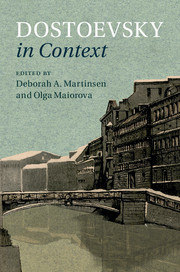Book contents
- Frontmatter
- Contents
- List of illustrations
- Notes on contributors
- Acknowledgments
- Note on citation, transliteration, glossary, and dates
- Chronology
- 1 Introduction: the many worlds of Dostoevsky
- PART I SOCIAL, HISTORICAL, AND CULTURAL CONTEXTS
- i CHANGING POLITICAL, ECONOMIC, AND SOCIAL LANDSCAPE
- ii POLITICAL, SOCIAL, AND CULTURAL INSTITUTIONS
- 9 Russian monarchy and the people
- 10 Empire
- 11 Service ranks
- 12 Education
- 13 Science, technology, and medicine
- 14 Jews, race, and biology
- 15 Suicide
- 16 Children
- 17 Gambling
- iii SPACE AND PLACE
- iv RELIGION AND MODERNITY
- PART II LITERATURE, JOURNALISM, AND LANGUAGES
- Glossary
- Further reading
- Index
- References
15 - Suicide
from ii - POLITICAL, SOCIAL, AND CULTURAL INSTITUTIONS
Published online by Cambridge University Press: 18 December 2015
- Frontmatter
- Contents
- List of illustrations
- Notes on contributors
- Acknowledgments
- Note on citation, transliteration, glossary, and dates
- Chronology
- 1 Introduction: the many worlds of Dostoevsky
- PART I SOCIAL, HISTORICAL, AND CULTURAL CONTEXTS
- i CHANGING POLITICAL, ECONOMIC, AND SOCIAL LANDSCAPE
- ii POLITICAL, SOCIAL, AND CULTURAL INSTITUTIONS
- 9 Russian monarchy and the people
- 10 Empire
- 11 Service ranks
- 12 Education
- 13 Science, technology, and medicine
- 14 Jews, race, and biology
- 15 Suicide
- 16 Children
- 17 Gambling
- iii SPACE AND PLACE
- iv RELIGION AND MODERNITY
- PART II LITERATURE, JOURNALISM, AND LANGUAGES
- Glossary
- Further reading
- Index
- References
Summary
In a pivotal scene from Crime and Punishment (1866), Raskolnikov ponders the fate of Sonya, the virtuous young woman who has turned to prostitution in order to support her destitute family and with whom he is falling in love. Three possible paths lay open before her: “She can throw herself in a canal, end up in a madhouse, or … or, finally, abandon herself to debauchery” (6:247; Pt. 4, Ch. 4). In the end, of course, Sonya takes a fourth path: she follows Raskolnikov to Siberia where she ultimately helps him to find love, faith, and redemption. Yet her broader predicament – that of the many destitute or fallen women in the reform-era Russian city – forms a broader sub-theme of both Dostoevsky's novel and several of its literary rivals of the 1860s, including Vsevolod Krestovsky's potboiler, The Slums of St. Petersburg (1863–6), and Nikolai Chernyshevsky's revolutionary utopia, What Is To Be Done? (1863). That suicide was naturalized as a sad but unexceptional corollary of urban poverty and vice points to the tremendous shifts that had occurred in the social status and meaning of the act by the 1860s.
No less a heinous sin in Russian Orthodoxy than in Roman Christianity, suicide was prohibited under canon law and Church regulations, which labeled it an act of self-will and thereby a repudiation of God's sovereignty. Introduced into secular law under Peter the Great (1682–1725) in the early eighteenth century, suicide retained this connotation of willful insubordination, and it would remain a criminal offense throughout the imperial era. In principle, intention was an integral component of both the ecclesiastical and criminal regulation: only suicides judged mentally competent were to be punished. In practice, however, these judgments often relied upon attitudes about morality, social status, and reputation. Whereas an individual's upstanding character could constitute evidence that a suicide must have been committed in the throes of madness or disease, an individual's immoral conduct – a pattern of drunkenness, licentiousness, or disobedience – often counted toward conviction.
Over the course of Dostoevsky's lifetime, the legal consequences for suicide varied widely. During his youth, practices were often harsh: many suicides were denied Christian burial, while attempted suicides were typically subjected to punishments ranging from a church penance to whippings and even Siberian exile.
- Type
- Chapter
- Information
- Dostoevsky in Context , pp. 131 - 138Publisher: Cambridge University PressPrint publication year: 2016



